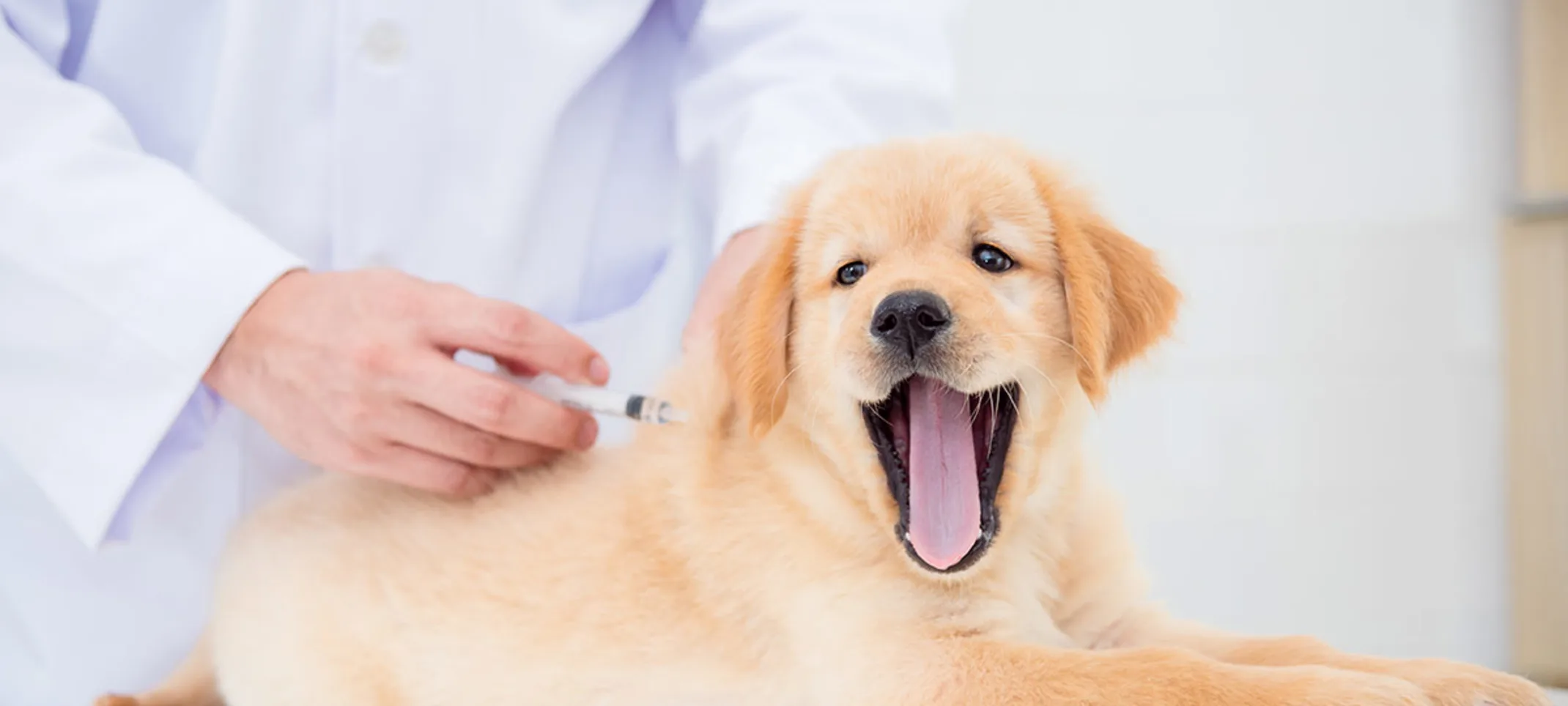Confederate Woods Veterinary Hospital
Vaccinations
Preventative care is an important aspect in maintaining your pet’s health. Proper vaccination is vital in protecting them against harmful diseases.

Overview
We believe that preventative care is one of the most important aspects of maintaining your pet’s health. There are a variety of diseases that affect animals, so proper vaccination of your pet is vital in protecting them from the many types of illnesses to which they are susceptible to.
Why are vaccinations important?
Vaccinations are vital to the health and protection of your pet, and serve as a preventive measure in combating viral diseases like Parvovirus, Parainfluenza virus, Distemper, Lyme Disease, Panleukopenia, Feline Leukemia Virus, and Rabies.
When should my pet get vaccinated?
Vaccinations are particularly important for puppies, kittens, and other young animals that have immature immune systems. Veterinary vaccinations generally begin at 6-8 weeks of age and then boostered throughout your pet’s life depending on the vaccine. Our doctors will determine the appropriate vaccination plan for your pet.
How are vaccines administered?
Vaccines help to combat diseases by exposing the pet's immune system to inactive or small amounts of a particular form of bacteria or virus. Vaccines are administered through a subcutaneous injection (under the skin), orally, or intra-nasally, depending on the vaccine.
Vaccinations are accompanied by a consultation and examination with our veterinarians to make certain that your pet's condition is stable enough to receive them. Proper and timely administration is necessary to ensure optimal protection.
Feline Vaccinations
Cats are very different creatures from dogs – they have different immune systems, and there are different diseases that can affect their quality of life. The vaccine recommendations our doctors make for your cat are always based on a review of your cat’s health history, environment, activities, and lifestyle. In general, the vaccines we recommend are protection against Rabies, “Distemper” (Rhinotracheitis, Calicivirus, Panleukopenia), and the Feline Leukemia virus.
Rabies
The Rabies vaccine is recommended (and required) for all pets. Rabies is a virus that kills all mammals that are exposed, including humans. Therefore an important method of protecting your family from this virus is vaccinating your pets.
Feline Distemper
Feline panleukopenia (also called feline distemper) is a highly contagious and deadly viral disease in cats. Because of the serious nature of the virus and the continued presence of the virus in the environment, vaccination is highly recommended for all cats.
Calici Virus and Rhinotracheitis
Feline calicivirus and feline rhinotracheitis virus are the most common causes of upper respiratory tract disease in cats. Most cats are exposed to either or both of these viruses at some time in their lives. Once infected, cats will never completely rid themselves of the virus. But, even if your cat has already been exposed, vaccinating them will minimize the severity of their respiratory infection.
Feline Leukemia
Feline leukemia virus (FeLV) is the leading viral killer of cats. The virus is passed from one cat to another through bite wounds, casual contact with infected cats, and from an infected mother cat to her kittens. If your cat goes outside or has contact with cats that go outdoors, your cat is at risk of being exposed to this virus. Therefore, we recommend the Feline Leukemia vaccine for all cats that go outdoors.
Canine Vaccines
Not every dog needs every available vaccine. Our vaccine recommendations are based on a review of your dog’s health history, environment, activities, and lifestyle. These recommendations may change over the course of your dog’s life, as travel habits, environment, and health status may change. We consider all of these factors to determine the appropriate vaccines for your dog.
Rabies
The Rabies vaccine is recommended (and required) for all pets. Rabies is a virus that kills all mammals that are exposed, including humans. Therefore an important method of protecting your family from this virus is vaccinating your pets.
Distemper
We consider the Distemper Vaccine to be fundamental protection for your dog, and we usually recommended this vaccine for every dog living in our area. The Distemper vaccine protects your dog from four viruses that can make your dog very sick: Parvovirus, Distemper virus, Adenovirus-2, and Parainfluenza. The abbreviation for this combination vaccine is frequently written as “DHPP,” or “DAPP” in their medical record.
Other vaccines that we may recommend for your dog include vaccination against upper respiratory infections (Bordetella bronchiseptica and Canine influenza), Lyme disease, and Leptospirosis.
Bordetella
Bordetella bronchiseptica is a bacteria that causes respiratory disease in dogs. It is one of the most common bacterial causes of canine infectious tracheobronchitis, or “kennel cough”. Bordetella bacteria are highly contagious, easily transmitted through direct contact or the air, and resistant to destruction in the environment. Our doctors may recommend the Bordetella vaccine for your dog if you take them regularly to a groomer, a boarding facility, or you take your dog to public places where they may encounter other dogs, such as a dog park.
Canine Influenza
Canine influenza (also known as dog flu) is another contagious respiratory disease in dogs. There are two different influenza A dog flu viruses: the H3N8 virus and the H3N2 virus. Our vaccine helps protect dogs against both strains. The risk factors for your dog to become infected with canine influenza are very similar to those for Bordetella infection. Our doctors may recommend this vaccine for your dog if you take them regularly to a groomer, a boarding facility, or you take your dog in public places where they may heavily encounter other dogs, such as a dog park or dog sporting events (conformation/agility/obedience competitions).
Lyme Disease
Lyme disease is a bacterial infection spread by the black-legged (deer) tick, which is found in overwhelming numbers in our community. Symptoms of Lyme disease include joint pain, depression, and even kidney failure. If your dog spends any time outdoors at all, especially near fields or woods, then vaccination against Lyme disease is essential.
Leptospirosis
Leptospirosis is a serious disease that dogs contract by drinking, walking, or swimming in water contaminated with microscopic bacteria, or by licking other areas where infected animals have urinated. This bacteria is spread by infected mice, rats, raccoons, possums, and even other dogs. Humans may also be infected by leptospirosis, so protecting your dog against this disease is another way to protect your family. The good news is, leptospirosis can be prevented through vaccination. We will assess your pet's risk for leptospirosis annually during wellness exams and recommend vaccination for dogs in the at-risk population.
Check Your Pet's Vaccination Status:
Log in to your Pet Portal to check your pet's vaccination schedule.
How Often Will My Pet Receive Vaccinations?
Some vaccines must be administered annually, while others provide a longer duration of immunity. For many vaccines, pets will need a series of more frequent vaccinations initially to build their immunity. The duration of immunity and the schedule for your pet's vaccinations depends on multiple factors. The age of your pet, vaccination history, current health status, risk factors, scientific studies, and local mandates (such as for vaccination against the rabies virus) are all considered. Our veterinarians will determine which vaccinations are necessary for your pet during their annual exam based on an assessment of your pet’s health history and their risk of exposure to disease.
How Will My Pet Respond After Receiving Vaccines?
Most pets experience mild soreness at the site of the injection after vaccination. The soreness may last for up to 24 hours, but usually, it disappears within a few hours. Some other responses your pet may have to vaccinations include discomfort and swelling at the site of the vaccine, a mild fever, and a mild decrease in appetite and activity.
We always ask you to closely observe your pet during the first 24 hours after they have received their vaccines. Vomiting, diarrhea, swelling of their face, or extreme lethargy are signs of a more serious response to their vaccine. If you see any changes that concern you, do not hesitate to call us.
Are Any Vaccines Required by Law?
Pennsylvania law requires that all dogs and cats be vaccinated against the Rabies virus. This vaccine is first given by a veterinarian at 12 weeks of age and is the only way to prevent your pet from succumbing to the Rabies virus.

